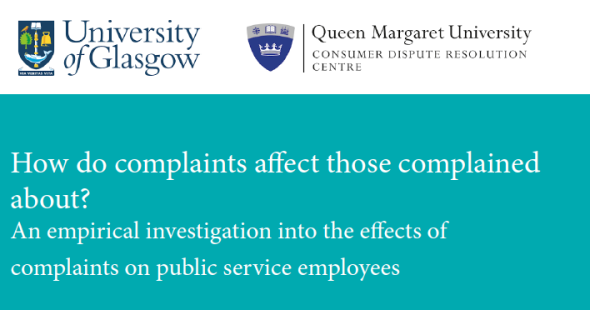Research Report: How do complaints affect those complained about?
Posted: January 2, 2018 Filed under: complaints, research | Tags: Queen Margaret University, Scottish Public Services Ombudsman, University of Glasgow Leave a comment

A recent research report highlights the impact that complaints have on public-sector employees and their well-being. The researchers, from Queen Margaret University and the University of Glasgow, worked with the Scottish Public Services Ombudsman to design the research. Here, one of the report’s co-authors (and co-researcher on the Informal Resolution by Ombuds project) describes the key findings and the discussion held at a related conference on how to support individuals who are subject to complaints.
Note: This article was originally posted by Carolyn Hirst on LinkedIn on 19 December 2017 at: https://www.linkedin.com/pulse/research-report-how-do-complaints-affect-those-complained-hirst
By Carolyn Hirst
I am delighted to have had the opportunity to work with Dr Chris Gill, University of Glasgow, Dr Maria Sapouna, University of West of Scotland and Jane Williams, Queen Margaret University on this empirical investigation into the effects of complaints on public service employees. We also worked closely with the Scottish Public Services Ombudsman who advised us on the research design and helped us to secure access to respondents.
The Executive Summary of our Research Report is set out below:
Executive Summary
This report presents the findings of a mixed methods research project investigating the effects of complaints on local authority planning staff and housing association staff in Scotland. The research included an online survey of 132 individuals who had been subject to a complaint and follow-up qualitative interviews with 16 people who had responded to the survey.
The key finding of the research was that being complained about affects the health and well-being of employees, their work practice, and the way they perceive service users. 71% reported their work practice was negatively affected by a complaint, 67.2% reported their health and well-being was affected, and 61.2% reported their attitude to service users being affected.
For most, the effects were moderate and respondents were most likely to say they had been “somewhat” affected: 56.5% in relation to their work practice, 51.6% in relation to their health and well-being, and 52% in relation to their attitude to service users. In relation to each issue, a significant minority reported being affected “a great deal” by a complaint: 14.5% in relation to their work practice, 15.6% in relation to their health and well-being, and 9.4% in relation to their attitude to service users.
Of those who reported that their attitude to service users had been negatively affected by the complaint, the three most common effects were being more cautious in dealing with certain types of service users (66.7%), being more cautious and distrustful towards service users generally (29.8%), and leaving certain service users to be dealt with by colleagues (12%).
This overall picture was explored further in qualitative interviews. These interviews provided a range of insights about the kinds of effects people experienced when complained about and the factors that seemed important in determining whether they would experience a negative impact.
The types of effects commonly reported by respondents included emotional trauma and loss of selfconfidence. Experience was seen as important in moderating the effect of complaints, with more experienced employees developing a ‘thick skin’ over time. Interestingly, attitudes to learning from complaints remained generally positive even where people had negative personal experiences of having been complained about.
Factors that made it more likely that a complaint would have an effect on staff included: perceiving the complaint as personal (rather than about service or the organisation); perceiving the complaint as an attack on the individual’s professional identity; and perceiving the complainant’s motivation as vexatious or unreasonable. Context was also important, with planning staff more likely to be affected than housing staff.
The operation of the complaint process was particularly important in terms of whether staff were likely to feel a complaint had affected them negatively.
Overall, views of the complaint process were fairly positive, but those who reported being negatively affected by a complaint were more likely to have a negative view of the fairness of the complaint process.
In terms of the support that respondents felt would help mitigate the negative effects of being complained about, some felt that complaints were simply ‘part of the job’ and that support was generally not required except for junior staff. Others highlighted developing an open culture around complaints, managerial support, peer support, and a fair complaint process, as means through which the impact of complaints could be reduced.
Our full Report can be accessed at:
And we presented our research findings at a conference organised by the Scottish Public Services Ombudsman, Queen Margaret University and the University of Glasgow which took place on Tuesday 5 December 2017. This conference explored how best to support public service employees who have been subject to a complaint. A note of the sessions at this conference can be found at: